Like most genre fictioneers, when we started out, we learned by looking around us. Inevitably, what worked for some tripped up others. Magic bullets misfired. Shortcuts led off cliffs. The go-to social media platform kept switching and imploding. Every sure-fire promo solution devolved into intrusive cliché. We realized careers (and books and people) are never interchangeable. The one constant we observed: the winners played the game.
We want to help you promote your genre fiction in a way that fits your skills and flaws. We’ve tried to create the unique guide to genre-fiction promo we wish someone had handed us when we were fresh on the scene.
We have chosen games not as a metaphor, but as a model. Like promo, games are something you choose to undertake, with rules and strategy and other players to navigate as you struggle to claim your prize. Surrounded by allies and enemies, gamers must pit their wits against shifting odds with imagination and courage. Games present crazy stakes, cooperative conflict, and an artificial danger; the disappointments may be real, but no one gets disemboweled because their bookmarks didn’t arrive in time for a signing. With a personal strategy and a sense of fun, everyone who participates comes out ahead. Everyone plays a game by choice, and no one brings their A game by accident.
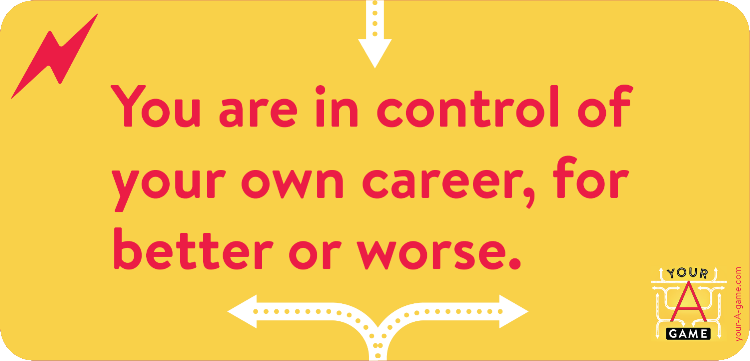
The Winning Strategy
In 1984, scientist Robert Axelrod published a book called The Evolution of Cooperation, a study which set game theory on its ear by explaining the reasons human cooperation persists despite the aggression and competition we associate with evolutionary survival of the fittest. Axelrod hosted an extended tournament of fellow academics that allowed them to play out strategies in a non-zero sum game known as the Prisoner’s Dilemma.[i]
For this tournament, a Russian mathematician named Anatol Rapoport submitted a strategic program he named “Tit for Tat”, which contained only four lines of computer code and completely dominated the competition. After the participants analyzed the results, Axelrod hosted a rematch in which players tried to best the Tit for Tat model…and failed. Tit for Tat remained the clear winner even after its plan of action had been dissected by opponents. In fact, its barebones clarity contributed to its viral efficacy: the more it won, the more others understood that they should emulate it. Its success was infectious.
How could a four-line program win so handily? Give and take. Tit for Tat’s strategy was to cooperate with the opponent in round one and then continue by mimicking the opponent’s moves in subsequent turns. Essentially this is a child’s idea of justice (hence the name), but the genius of it was that while playing against many different strategic models, Tit for Tat operated with only two rules:
- cooperate with other players initially
- reciprocate in subsequent rounds based on the other players’ choices[ii]
Even if injured, Tit for Tat forgave slights and betrayal as soon as they’d been punished, which forced other players to make amends by cooperating again. That forgiveness snuffed out any retaliations that would waste time and points. Nevertheless, retaliation had to occur because bullies or cheaters would take advantage of a naive optimist.
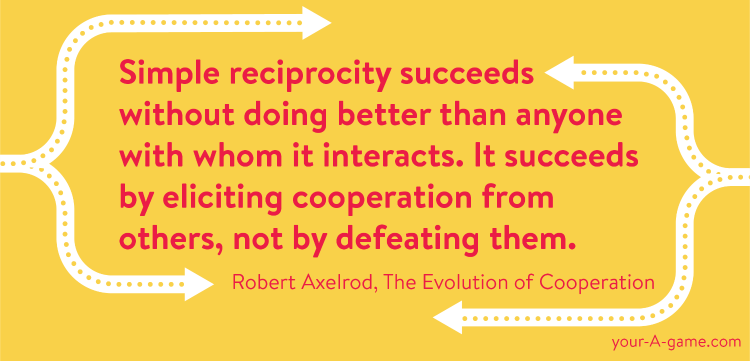
Tit for Tat won with a good, old-fashioned show of courtesy. In game after game, hard-coded graciousness propelled Tit for Tat to a record number of points against players of every strategic bent. In analyzing the reasons for Tit for Tat’s double triumph, Axelrod identified the four winning characteristics of any dynamic game:
- Grace: cooperate and never be the first to attack or deflect. Selfishness backfires. Never cheat your allies. (Be nice!)
- Responsiveness: retaliate when injured but forgive as soon as cooperation resumes. (Respond appropriately and instantly.)
- Clarity: don’t get too clever or try to predict other players’ moves. Keep it simple. (Don’t get in your own way.)
- Generosity: play fair and don’t envy the other players’ accomplishments. Celebrate other Tit for Tat wins. (Treat other players as partners.)
In other words, Tit for Tat is the root of every A game.[iii] No matter how complicated your genre-fiction marketing scheme, how complex your personal situation, how skilled or unskilled you are at promotion, or how many times you’ve read this book, at the beginning and end of every day these four principles—grace, responsiveness, clarity, generosity—will be essential to your success. Cooperate and reciprocate.
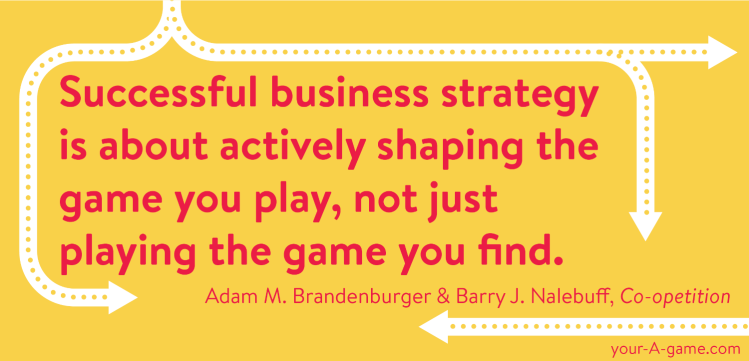
Zeros & Heroes
The first step in viewing the game of genre-fiction promotion is to address the question of what type of game it is, or isn’t. Specifically, we must address the common misconception that publishing is a zero-sum game.
Zero-sum games divide a limited pool of available prizes between the players. Like slicing a pie, every piece cannot be claimed again; for one person to win, another must lose. None of the players’ strategic decisions can increase or decrease the resources available to them during the game, so they compete against each other for their slice. For any triumph there must be a loss and each champion leaves losers in their wake. Scarcity defines and limits every potential success.
By definition, a zero-sum game is a closed system because the profits and strategies are limited: winner takes all.
Non-zero-sum games allow resources to be created and destroyed. Since new elements, players, and strategies can be introduced, a win by one player doesn’t require a loss by another. These games often produce collaboration within competition because awareness and cooperation maximize the rewards to everyone participating. Abundance spawns fractal possibilities.
By definition, any open system like publishing is a non-zero-sum game: many wins are possible because new rewards, new resources, and new players can enter and alter the game’s flow at any time.
Challenge your assumptions about publishing as a zero-sum game by considering these questions about the strategic challenges of genre promotion:
- Does publishing have a finite pool of readers, writers, manuscripts, genres, shelves, formats, publishers?
- If someone else sells a million copies of their book, does that limit the number of copies you can sell?
- Do authors who attack or obstruct other authors have successful fiction careers?
- Do genre readers restrict their purchases by any one author, subgenre, or publisher? Is there a limited supply of humans who read?
Abundance demolishes zero-sum strategy.
Like all entertainment (and indeed all business) publishing operates as an open system, producing new content, readers, subgenres, vendors, and profits daily. As e-publishing has flourished it has moved from scarcity to abundance.
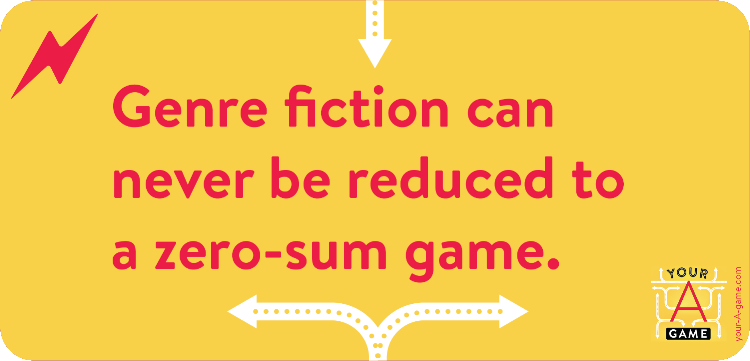
No one becomes a bestseller by tossing every other potential blockbuster on a bonfire and assassinating other authors. No bestseller stays at number one, on every list, forever. Readers who pick up one book do not lose the ability to pick up many others. All research indicates that the person who enjoys one book will probably seek out similar titles, so every book sold increases the chances another author’s reader might become one of yours (or vice versa).
You are not in competition with your colleagues. You are not in competition with anyone but yourself. In fact, the more you work positively and dynamically with your peers, the more inevitable your success.
One of the greatest inducements to fair play is the prospect of repeat business, and genre publishing is all about word of mouth and repeat business. If everyone involved knows that they’ll be interacting again, they’ll go further to satisfy each other’s concerns by cooperating and making concessions. We see that logic operating with the “what happens in Vegas” mentality of rude tourists. If you know you’ll see these folks often, you probably won’t go swimming naked in the hotel fountain. The damage to loyalty and trust can be irrevocable, and so the possibility of repeat business discourages misbehavior that damages the professional ecosystem.
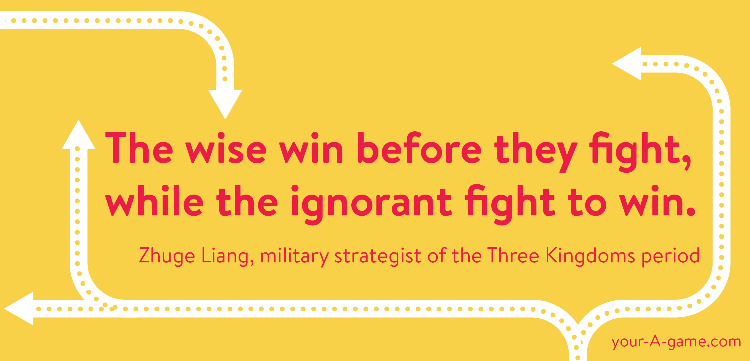
For a game to progress, all players must agree to abide by the rules and engage each other at their best. Serious players bring two qualities to the table, generosity with other players and retaliation to anyone who refuses to play fair.
There is no substitute for caring for your colleagues and your readers. Your time is limited, your budget is limited, your output is limited, but your heart and your imagination are infinite.
ENDNOTES
[i] For more information on the Prisoner’s Dilemma, see Evolution of Cooperation by Robert Axelrod or Games Prisoners Play: The Tragicomic Worlds of Polish Prison by Marek M. Kaminski.
[ii] In his book Game-changer, Professor David McAdams calls these two essentials “Intrinsic desire to cooperate” and “Power to punish others who fail to cooperate.”
[iii] In 2004 game theorist Graham Kendall hosted a contest in honor of the twenty-year anniversary of Axelrod’s original experiment. It was won by a group who managed to improve on Tit for Tat because the original strategy wasn’t generous enough. Increased cooperation improved the odds and won the day. cf The Art of Strategy by Avinash Dixit & Barry Nalebuff, p. 77.
© 2016 Damon Suede & Heidi Cullinan, All Rights Reserved

